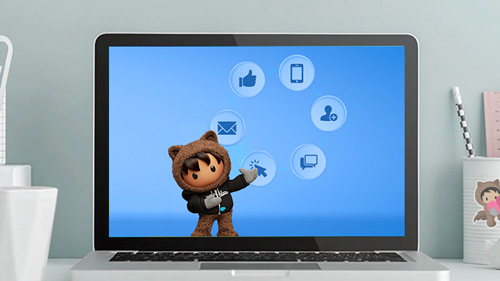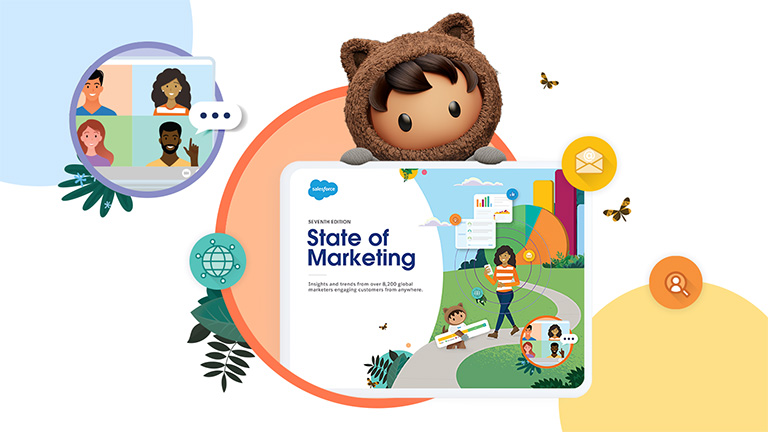Introduction
Marketers have to juggle several factors while building their marketing strategies—they need to balance channel choices, budgetary constraints, and creative pressures. But before this juggling even begins, they need to understand their target audience.
The first step in effective marketing is understanding the buyer’s profile. A poor understanding—and consequently, targeting—of buyers is likely to cause the marketer’s efforts to go down the drain. Unlike B2C marketing, which focuses more on high volume transactions that revolve around shorter sales cycles, B2B marketing is more driven towards engaging niche audiences around invariably longer sales cycles.
Business buyers have different demands, expectations, and needs. Marketing to business customers (B2B marketing) is different from marketing to individual retail customers (B2C marketing). In fact, with B2B, marketing is so nuanced that it is a distinct marketing methodology and subject in its own right. This is why we’ve put together this deep dive on B2B marketing to help you understand what B2B marketing is all about, how your marketing teams can excel in lead generation, the best B2B strategies for 2022, and lastly, the handy marketing automation tool that can help businesses deliver their messages to decision-makers.
What is B2B marketing?
B2B marketing refers to the process of a business marketing its products, services, and content to another business instead of to individual retail customers. The primary purpose of B2B marketing is to make other businesses aware of the value proposition of your brand, products, services, and content, and convert them into customers.
Examples of B2B marketing are:
- A software developer licensing sales or inventory software to retail businesses
- A mining company selling its mined ore to an iron and steel mill
- A logistics company providing shipping and transportation services to various businesses
Why B2B marketing?
Most businesses need the products and services from other businesses as inputs to function; businesses with complete vertical integration—that is, a completely self-contained production and distribution process—are rare. As such, the pool of business customers is huge, and trying to tap into it is why B2B marketing exists.
A manufacturer of books will, for instance, buy paper from a paper mill, binding machines from a machine manufacturer, and printing ink from chemical companies. It will, additionally, pay a software company for inventory and accounting software, and a logistics company to distribute its finished goods to wholesale and retail sellers. These numerous vendor relationships are often a result of lead generation that forms part of B2B marketing exercises.
Not only is the pool of business customers large, but it is also potentially lucrative. Business customers usually buy in large quantities and continue doing so regularly.
Using the above example of a book manufacturer - they are likely to buy ink in large quantities on a weekly or monthly basis, as opposed to a retail or individual customer who might need to buy a relatively small quantity of ink once every few months.
How does B2B marketing work?
The first step in B2B marketing is creating awareness about your business or brand and the universe of products and services that you are offering to clients and customers. B2B marketing gets business customers interested in your brand and nurtures prospects to convert them into paying customers. B2B marketing aims to develop lasting, meaningful relationships between your brand and your business customers.
B2B products and services tend to be more complex and price-sensitive than B2C segments; therefore, strong relationships between suppliers and customers are vital. B2B marketers need to ensure their communication is informative, technically accurate, and transparent. A retail customer looking to buy a single t-shirt might not care much about his relationship with the seller; a business customer sourcing thousands of t-shirts from a garments manufacturer sure will. They may also seek out more information like the quality of the fabric, the type of dyes used, and sizing options.
B2B marketing, in short, is more about developing a lasting relationship with the business customer than just closing a sale. It’s a slightly slower process, but the big rewards make the process worth the time and effort.
The importance of B2B marketing
B2B marketing is vital for a business or brand. As mentioned earlier, B2B sales usually bring in greater revenue over a longer period. This provides a sort of stability that can encourage vendors to invest in growing their business. Effective B2B marketing is important for the following reasons:
- To draw in prospects: The world of business sales is competitive. With business sales being as lucrative as they are, it’s no surprise that there are a lot of vendors vying for a slice of the pie. Good B2B marketing can help differentiate you from the crowd and draw prospects in for your products or services.
- To build engagement: B2B sales are hardly as straightforward as retail sales. Business buyers usually tend to shop around more and need additional information before finalising a purchase. B2B marketing can help build engagement with business customers, nudging them towards the closing of a sale.
- To increase sales and revenue: B2B marketing helps generate leads that can be nurtured by the B2B sales team. Quality leads generated by B2B marketing, when converted, lead to long-term revenue.
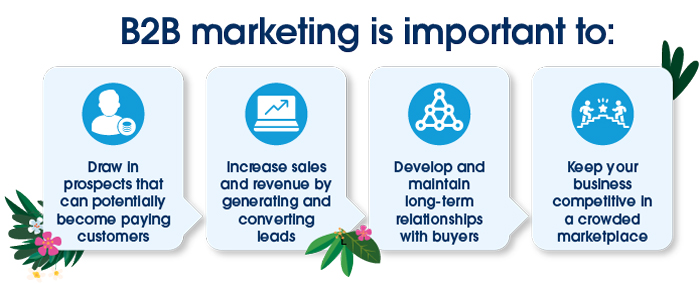
Who is B2B marketing for?
B2B marketing is for any business that wants to sell its products, services, or content to another business. Almost every industry has B2B players, whether machine making, raw material processing or spares manufacturing, software-as-a-service (SaaS), logistics, telecommunications and connectivity, or consultancy.
B2B marketing involves specifically targeting decision-makers in companies that are potential business buyers. Depending on industry and scale, this target audience can range from a proprietor to a CXO-level executive in a multinational corporation. The traditional notion that B2B marketing only deals with a specific age group, income or profile is fast fading. With a workforce and marketplace that is increasingly dominated by Millennials and GenZ, start-ups being co-founded and scaled by fresh-out-of-college graduates, and decision-makers hailing from a spectrum of geographies (think, peri-urban, Tier 2 cities and towns) as well as aspirations, there is no monolith B2B buyer persona that marketers can claim as their typical buyer.
In effect, B2B marketing requires a nuanced approach with a dynamic team comprising professionals with varied skill sets, industry experience, and domain expertise.
Types of B2B marketing
As with any marketing activity, B2B marketing can be undertaken in many forms. The type and channel chosen for B2B marketing activities will differ from one organisation to another. These depend on the industry, products, services, and what marketing goals the company is looking to achieve. There are three primary types of B2B marketing:
1. Digital B2B marketing: Everybody’s online in the twenty-first century, including your potential business buyers. Digital B2B marketing is a highly scalable, cost-effective way to reach your targeted customers with a granular level of targeting. With digital marketing, marketers can reach customers that are most likely to be interested in the product or service being sold, and reach them at the most effective time. Digital B2B marketing can take various forms: social media advertisements (LinkedIn), email marketing, and visibility in search results using SEO tools.
2. Traditional B2B marketing: Traditional B2B marketing using media like radio, television, and print ads casts a wider net than digital marketing and tends to be more expensive. However, such broad-based marketing helps build your brand equity. It boosts brand awareness so that when potential business buyers are shopping around for a new vendor, your brand will be front and centre in their minds. Traditional B2B marketing also includes media such as billboards, bench ads, mail brochures, and presence at expos and trade shows.
3. Personal B2B marketing: Personal B2B marketing involves pitching your products, services, and content in face-to-face meetings. Personal marketing is expensive and not scalable, but it offers the highest conversion rate. Personal marketing leverages relationships to build brand awareness and move deals towards closing. Personal B2B marketing is often used in collaboration with digital or traditional B2B marketing. The latter two types generate leads, while the former follows up.
4. Account-based marketing: Designed to focus attention on high-value customer accounts, account-based marketing (ABM) programs are inherently collaborative efforts shared between marketing and sales teams. Compared to their underperforming competition, high-performing B2B marketing teams are more likely to collaborate effectively with sales teams on ABM programs. Some of the marketing technology platforms that are being adopted by B2B marketers include marketing automation for lead nurturing, chatbots, social listening, and sentiment analysis.
B2B marketing strategies
The specific B2B marketing game plan differs for every business based on factors like its goals, industry, target audience base, marketing budgets, etc. There are various B2B marketing strategies a business can implement to reach its target audience more effectively. But before delving into strategies, it helps to understand the loose framework of the B2B buyer’s journey:
1. Awareness: The buyer’s journey from becoming a lead to an actual customer begins with awareness of a need or a problem they are facing. The existence of this need or problem starts nudging them towards the quest for a solution.
2. Consideration: The buyer is fully aware of their problem and has started researching products and services that might satisfy their requirements. At this stage, the buyer is both actively searching for products and services and is passively receptive to marketing advances from businesses that offer solutions to their problem.
3. Evaluation: Your marketing strategy will also be informed by the channels you choose. Explore the benefits and downsides of the various channels you could use from perspectives such as cost, ROI, and popularity of the channel among your target audience.
4. Decision: The buyer has now studied all the available solutions to their issues and has made a shortlist of vendors who might be able to help them. They will now dive deeper to try and whittle down the list of vendors yet again.
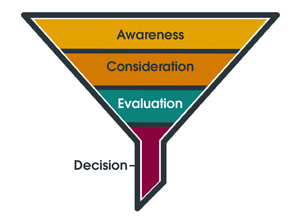
Here are the steps to keep in mind before working on a B2B marketing strategy:
- Position your brand: Drafting any effective marketing strategy begins with understanding and defining your brand position. Your brand position defines who you are, especially from the customer’s perspective.
- Define your target audience: Defining your target audience will help you create buyer personas, which in turn will help you fine-tune your brand’s marketing messaging. A thorough understanding of your target audience is key to creating effective B2B marketing strategies.
- Do a competition check: Compile a list of your competitors and understand their offerings, the tactics they are using to sell them, and the marketing efforts they are undertaking. Understanding your competitors’ activities will inform your own B2B marketing strategy and help you avoid reinventing the wheel.
Now that you have laid the foundation, it’s time to dive in with a B2B marketing strategy. Here are 4 effective digital B2B marketing levers you can leverage:
Strategy for B2B email marketing
Email marketing is a tried-and-tested method of reaching out to potential business customers. Email is a widely used tool among B2B customers. Good, informative promotional emails help convert subscribers into leads and eventually into customers. Moreover, email marketing allows you to build one-to-one engagement with subscribers and potential clients - the human connection of B2B - through highly customised templates, thereby delivering a high return on investment.
Unlike B2C customers that respond best to entertainment and emotions, broadly speaking, B2B customers would respond to rationality and logic. They are looking for information on how the product and service on offer helps solve a problem or need. Email is an excellent medium for delivering information about your brand, product, and service. It allows you to convey to your potential B2B customer how you can save them time, money, resources, and how you can help grow their business.
While email is a great channel for B2B marketing, achieving success with it and standing out among the crowd requires some best practices:
a) Use subject lines that draw readers in: The first part of your email that the recipient will see is the subject line—an enticing subject line will draw them in to explore what you have to say in your email. Since inboxes tend to be cluttered, a strong, intriguing subject line is a great way to ensure that your email stands out.
b) Ensure that every email has a call-to-action: Your B2B marketing emails need to include a call-to-action (CTA) to convert the recipient from passive to active. It’s important, however, to restrict the number of CTAs in your emails to one, to direct the recipient to where you want them to be and save them from decision fatigue.
c) Design emails to work across devices: People access their emails interchangeably on their desktops, tablets, and mobile phones throughout the day. Email content that doesn’t adapt well to different devices is more likely to be deleted without being read or opened. To ensure recipients read your emails, make sure their design translates well across devices.
d) Segment your email according to the target audience: The same B2B marketing email might not be well-suited for everyone on your contact list. Different buyers are likely to be at different stages of the buying journey. To ensure that the right information reaches the right customer to nudge them towards a purchase, it helps to segment your contact list and send customised emails to your subscriber list. Marketing automation tools for email marketing can streamline the contacts list, give you actionable insights on your email engagement, and help you maintain a personal connection with your audience.
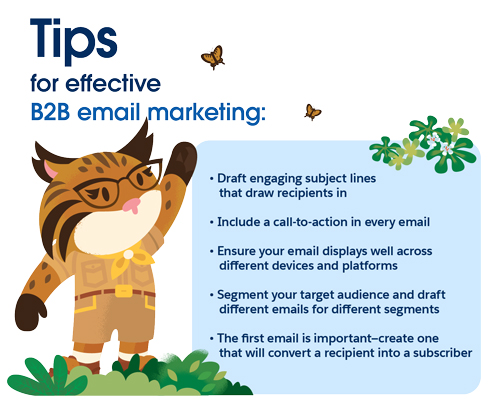
Strategy for B2B digital marketing
Digital marketing comprises a website, social media presence, pay per click (PPC), email marketing or newsletters, search engine optimisation (SEO), influencer marketing, and any other strategic channel that B2B brands can leverage online to target customers and engage them where they are. To make the most of your digital B2B marketing strategy, incorporate the following best practices:
a) Define your audience: Since digital marketing allows you to segment and target your audiences at a granular level, it helps if you can define your audience based on different buyer personas. This allows you to tailor not just your content, but also future product diversification and service expansion along the lines of your user behaviour and their changing needs and concerns.
b) Build a website: A website is a must for any business. A website is the foundation of all your digital marketing activities because it is the final destination for any call-to-action you put out there. Your website needs to comprehensively list all your products and services, explain your value proposition—how you can help your B2B customers—and offer clear ways of getting in touch with you for further queries.
c) Run paid digital ads: With a plethora of platforms, websites, and apps vying for everyone’s attention and money, getting your business in front of a potential customer is not easy. Paid digital ads can help with this—they can afford you better visibility on search engines and social media platforms. Digital ads offer broad and deep targeting options and give a high ROI on conversion events you have pre-determined.
d) Improve your chances of discovery: Having an engaging and informative website is important, but it’s not very helpful if your website is not easy to find. To increase the chances of your website being discovered, you need to improve the SEO, on-page and off it. SEO optimisation applies to things your customers can see (such as website content) as well as things they cannot (such as site speed and structured data).
Strategy for B2B content marketing
B2B customers, as we’ve mentioned before, expect expertise, knowledge, and customised information from vendors. And the best way to display these is through B2B content marketing. Your content marketing strategy needs to provide your customers and prospects with valuable information.
A sound B2B content marketing strategy anticipates what information the target audience is looking for, and imparts this information through the website or other promotional materials (like email, landing page, social media) to convert prospects to customers.
Business decision-makers are likely to trust content served to them in the form of an article as opposed to an advertisement. Understand your customers, identify their pain points, and create content that helps them address these.
Content marketing can take various forms, from website content to e-books, videos, blog articles, email newsletters, social media posts, brochures, or webinars.
Strategy for B2B social media marketing
You might think that social media is primarily used as a marketing tool by brands targeting individual customers, but in today’s times, business decision-makers use social media as much as anyone else, making it an important B2B marketing tool too.
Due to the lengthier and more complex business cycle, social media may not be the place you convert a B2B lead into a customer. However, it is certainly a great medium to build brand awareness and share your expertise or product/service information with your B2B audiences.
Social media marketing is also a great way to humanise your business and directly engage and interact with your target audience. It can be used to create a sense of community that will go a long way in ensuring brand loyalty among your customers.
B2B marketing trends to look out for in 2022
B2B marketing is a dynamic field, and each year brings with it new channels, new technology, and new challenges. The following trends are slated to define B2B marketing in 2022:
1. Measuring ROI is of prime importance
With so many marketing channels and tactics available, measuring ROI on specific marketing activities will continue to be an important metric for B2B marketing in 2022. Why? Because unless you have actionable insights on how effective your marketing campaigns are, you cannot plan, budget or measure further initiatives. Knowing your numbers will help you allocate appropriate resources - people, expertise and money - towards strengthening specific marketing channels.
2. Investment in influencer marketing is set to increase
In 2022, customers, both B2C and B2B, are shopping more online than ever before. This fundamental shift in their purchasing habits makes it crucial that B2B products and services show up online, especially on social media platforms. Against this background, influencer marketing has become a great way to market one’s products and services. Choosing the right influencer partnerships for your brand, product, and service is very important. While some brands opt for influencers with very big audiences, many have also seen success with micro-influencers with niche followings. Influencer choice depends on the nature of your product and service, and the marketing dollars you can allocate to it.
3. Increasing brand awareness will be the number-one goal
Brand awareness helps improve customer loyalty, engagement, and trust. It increases your brand equity and helps you stand out in a crowded marketplace. As a customer's product and service choices proliferate, and discovering substitutes becomes easier than ever due to online shopping, heightened brand awareness will give a business a competitive edge. Brand awareness can be increased by creating and posting high-quality, informative, and honest content across various digital and traditional marketing channels at a high frequency.
4. Case studies will gain a place of prominence among B2B marketers
Businesses are always keen on learning from other businesses. B2B marketers are set to increase investments in case studies. Case studies are a unique form of content that can help educate and inspire companies with real-life examples of other companies that have done things right (or wrong). Case studies can be made in various formats, such as text or video.
5. Audio, AR, and VR are losing favour
Certain marketing formats have not worked very well for B2B marketers in the past, so these are slated to fall out of favour in 2022. Audio (podcast), augmented reality (AR), and virtual reality (VR) content have been tried by B2B marketers, but many have found these formats of content don’t return a good enough investment considering the amount of time, money, and other resources that need to be invested in it. This is not to say that these formats have yielded poor results for everyone; you should certainly try them before you can decide whether they are right or wrong for you.
6. Optimising load speed will be the primary SEO strategy
There are many ways to improve a website’s SEO rankings, but optimising a website's load speed is going to be one of the most popular ones in 2022. How quickly a website loads affects its ranking in Google search results—a slow-loading site is likely to be ranked lower. A faster loading site will improve your website’s ranking and elevate the user experience too.
B2B marketing automation tools: Game changer for businesses
B2B marketing automation involves automating the workflow and tasks associated with B2B marketing activities. Businesses can use B2B marketing automation to improve their sales process and achieve their goals with greater efficiency.
B2B marketing automation can include:
- recording the profiles of customers that visit your website
- sending emails in response to specific actions (such as subscribing to your email newsletter)
- SMS outreach to help you build relationships with your B2B clients through templated and customised messages that are sent out in a timely manner
Businesses can choose from several B2B marketing automation tools available on the market, each of them offering a variety of features and capabilities at different price points. These tools can help you schedule promotional emails, converse with customers using chatbots, and track them through their buying journey. Which tool you use depends on the particular tasks of the B2B marketing workflow you want to automate and the goals of your marketing activities.
How is B2B marketing different from B2C marketing?
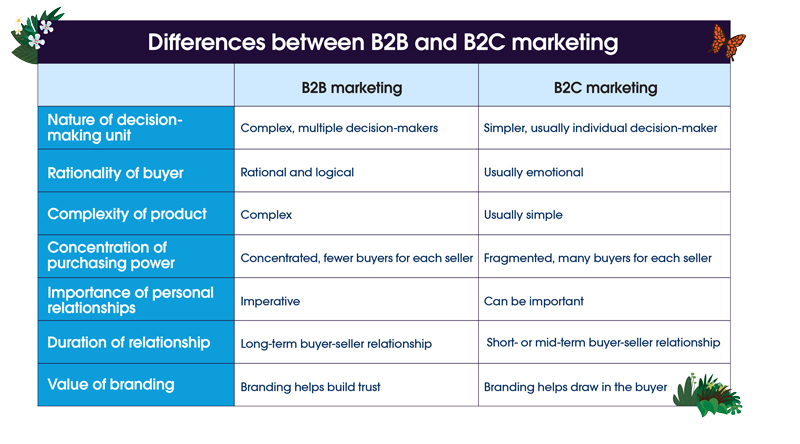
It’s easy to dismiss all kinds of marketing as much the same—the goal is to convince customers to buy a product or service after all—but this simplistic thinking would, in fact, be erroneous. The business buyer and their buying journeys are distinct from that of the typical B2C buyer in the following ways:
1. Complexity of the decision-making unit
The decision-making unit for a B2B buyer is usually more complex than that of a B2C buyer. In the case of B2C buyers, the decision-making is usually handled by one individual, whereas with B2B buyers, especially when it comes to larger purchases, the decision making to buy is handled by a team of employees, often a dynamic, shifting one, each with different expertise and opinions.
B2B decision-making units also make buying decisions over long periods. Before arriving at a decision, they look at various aspects of the purchase, such as budget, risk, productivity, after-sales support, technical viability, etc. As such, the B2B marketer needs to be well-versed in all these aspects of the product and service being offered. Additionally, they must also exhibit patience and tact while dealing with a diverse group of people who might often have conflicting requirements.
2. Rationality of the buyer
B2B buyers are often accountable for the purchases they make because these purchases directly impact the functioning of their business. B2B buyers tend to be more rational while making purchase decisions. Unlike B2C purchases, which are often impulsive and swayed by emotions, B2B purchases are primarily approached with logic and rationality. B2B marketing, thus, needs to appeal not only to the buyer’s emotional side but their logical side as well. It needs to inform primarily but can also educate and entertain if the service or product fits that narrative.
3. Complexity of products
The complexity of B2B products (such as machinery or SaaS) is usually higher than that of B2C products, especially because they are customised as per individual customer or business preferences. Even with seemingly simple products, these need to be integrated into wider systems and may thus require higher levels of examination and perhaps even modification. The complexity associated with B2B products requires the B2B marketer to be technically and thoroughly informed about the product or service they are promoting and to be able to inform customers even after the sale is closed - on deployment or adoption for instance.
4. Concentration of purchasing power
While the market for B2B products is vast and diverse, most B2B businesses tend to supply to a few buyers only. It is not uncommon to have purchasing concentrated among a few large buyers. The implications of this for the B2B marketer are that they have to be good at promoting products and services and maintaining relationships with existing customers.
5. Importance of personal relationships
B2B relationships often involve a personal element. B2B buyers tend to work with the same vendors for many years, repeatedly buying their products and services. As such, personal relationships inevitably develop between buyer and seller. This means that B2B marketing requires that marketers have great people skills. They have to be able to communicate with and engage their buyers well and inspire trust and confidence. B2B buyers tend to work with the same vendors for many years, repeatedly buying their products and services.
6. Duration of seller-buyer relationship
B2B relationships tend to be of a longer duration than B2C relationships. As mentioned earlier, business buyers either buy items that have a long life (machinery, for example) or buy the same things recurrently over a long time (such as spares, raw material, consumables). Longer-term relationships place two requirements on B2B marketing: maintaining relationships with buyers and disseminating thorough, technical information about products and services
7. The importance of branding
Branding is as important in B2B marketing as it is in B2C marketing. In B2B marketing, branding helps your products and services stand out in a crowded marketplace. If you can provide consistently good quality and service, your brand will become associated with those values. This means that B2B marketers need to pay attention to branding as much as the promotion of products and services.
Challenges that B2B marketers face
1. Limited market potential: B2B marketers have a small pool to fish for prospects and potential clients. B2B businesses are niche and would be in demand only amongst a narrow audience segment, making it really important to engage and retain existing customers. The loss of even one or two big-budget accounts in a calendar year could be a major blow to the business's bottom line.
2. Slow conversion cycles: The marketing funnel works much in the same way across B2B and B2C. However, the conversion cycle from the awareness stage to the decision-making stage would be slower and drawn out in the former. Since B2B services and products are pricier and more complex, B2B marketers have to spend more time and effort on nurturing the leads. This also means having a variety of information and expertise at each stage of the funnel to convince a prospect to become a customer.
3. Complex contractual obligations: Imagine buying a pair of shoes or a detergent off the shelf or online. It's as easy as paying via your digital wallet, and the product is in your hands without any hassle, wait, or T&C to review. On the other hand, if you are a B2B marketer, you have to rely on your collaborative, multi-functional teams to set up and review contractual obligations, legal clauses, and technical briefs for the prospect to sign off and come on board as a customer or client. There are often several rounds of negotiations before a deal is inked.
4. High level of customisation is not always possible: B2C marketers have a spectrum of product diversifications to entice the masses. Think about the choices you have in buying cereals, electronic appliances, or fashion accessories. And within certain consumer segments, such as automobiles, you can get certain features customised. That's not the case with B2B marketers as they cannot always promise a high degree of variation or personalisation in a standard service protocol, making it a challenge to cater to diverse businesses that might have distinct requirements.
5. Long-term relationship building: The B2B business model rests on the premise of less is more - meaning, fewer clients are fine so long as they are big-ticket, multi-year customers. What this implies is that you cannot just sell the product - you need to have an after-sales pipeline in place to keep your clients happy. This could take the form of dedicated customer relationship managers or account managers, multi-year extended warranties, annual updates and upgrades (if you are a software company), and the promise of the same level of support and service years into the contract. Far from this being only the domain of the sales teams or customer success team, it's crucial for B2B marketers to build long-term relationships with their clients through different formats of engagement.
The future of B2B marketing is fully automated
Effective B2B marketing involves strategic, multi-layered plans designed for specific prospects, followed by executional excellence and building long-term partnerships. These plans are built on the cornerstone of digital automation marketing tools that empower sales and marketing teams to engage with stakeholders at various points of the funnel and respond accurately to prospective demands.
Pardot, a marketing automation tool from Salesforce, offers list-building features, lead-scoring packages, contact tags, campaign customisation options, and a host of other capabilities for B2B marketers to pull specific levers to engage and build long-term relationships with their customers. When combined with an intuitive design, integration options, and AI-powered analytics, marketing automation tools can be a game-changer for businesses operating in a digital-first B2B marketplace.
